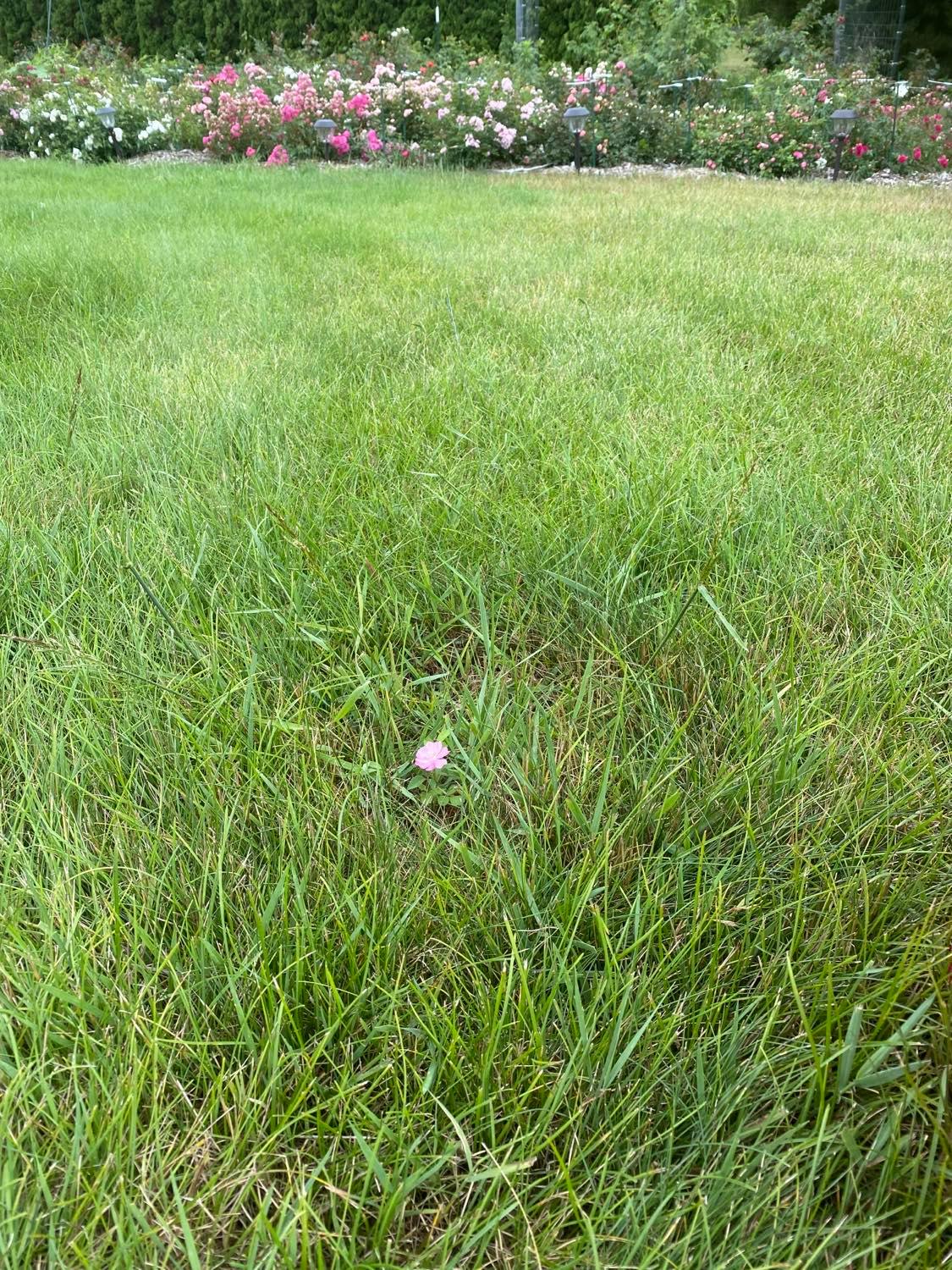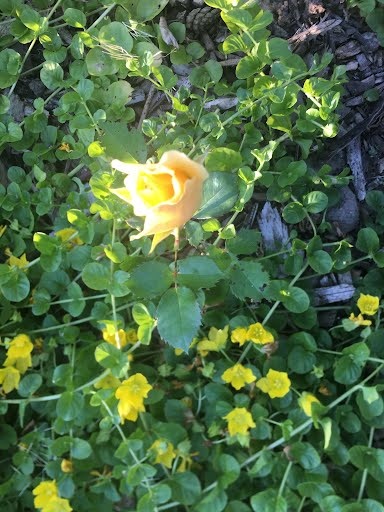I really enjoy polyantha roses and saw some color in the lawn today. Taking a closer look, it was a new volunteer seedling from this spring! Maybe seeing the picture will make you smile too.

Oh, c’mon… That really is not fair.
Can I mail you my seeds to toss in your lawn? ![]()
(That’s actually really cool…)
Philip, get a dog. All three of ours LOVE tomatoes and they think rose hips (plums, peaches), “balls” in general, are tomatoes. They eat them then they “plant” them all over the yard. The seeds are “pelleted” and they germinate perfectly.
My wife and child make me scoop.
…but the seeds couldn’t do much worse I suppose.
(Have you really had roses come up that way? I mean, I could work with it I suppose…) ![]()
Yup! Absolutely! The best tomatoes we’ve grown were “planted” by “The Goddesses” and if they can reach hips, they help themselves to them just as they have “maters” and fruit. Yes, I HAVE found rose seedlings germinating in the yard.
Gads luv it … reminds of a non-rose plant- animal kingdom natural movement synergistic flavour break through - Kopi luwak … still saving from my pension for my first cup … something to this enhanced organic encapsulate approach … vocabulary selection tough to keep input in obscurely high level fragrance zone.
David, what timing!
This appeared a few days ago. It is where I toss winter prunings to pile up for city compost recycling. That spot was for Shadow Ninja, “Butter Dream” (Sunshine Daydream x Sunsprite), “Caramel Sub” (Yellow Submarine x Dame Edith Helen), and Prairie Lass. As Caramel Sub is seed sterile, and its definitely not the other 2, it is 95% likely a Butter Dream self.

When I used to allow my Silkies to free range, I would find about 4-5 hybrids a year in very harsh places. I would let them grow out. Almost always selfs and never any of quality. It was always fun though. Nothing beats a silkie at recycling seeds… except maybe other ground fowl like grouse.
Now there are various falcon species coming in the area due to our good nature-keeping in Oregon, so they can no longer free-range. I have already inadvertently fed Mother Nature at least $500 in Silkie sales over the years… lol… oops. I have woke up in the morning before and watched these falcon types sit on top of their coop and just stare inside. Their coop is quite extensive, including tunnels, but completely enclosed in 1/4" galvanized wire mesh against rats, so they’re safe.
While the concept of groundcover roses seemed to have real commercial legs before people realized what a nightmare it is to keep them weeded, I’m just not sure that the world is quite ready for roses as turf…
Meilland has advertised White Meidiland as a “lawn replacement” for the past three and a half decades. Planted on four foot centers, it supposedly makes a suitable “ground cover”. 'White Meidiland' Rose
White Meilland looks good in this climate, but it honestly mounds pretty high. I couldn’t imagine trying to maintain it. Seems like a nightmare to try.
The only true groundcover I know of is ‘Green Snake’ and …Snow Carpet? I think… forgot. Whatever was at Heirlooms on display for years…
I think there is a mini wich from Japan used as a true groundcover, as well, but the name escapes me.
Roses have low tolerance to herbicides, especially Crossbow. I even wince when I have no choice but to use Grass-b-gon even though it is usually okay. Not always. Makes for the concept of groundcover roses especially unappealing.
Roses that mound in place are especially good as weed suppression, but they are in no way a “groundcover”. ‘Kent’ is a prime example, at least here. It is technically a miniature bred from “groundcovers”. It mounds up and out over time. Prune every 4-5 years. Let the understory black spot. No one can see it anyway. EZ PZ.
Snow Carpet definitely fits the mold of a “groundcover” rose well–at least in terms of proportions and health. Its thorns can bite, though, and it is not always dense or tall enough to suppress weeds or other plants except maybe in unusually idyllic conditions (at least in this part of the world). Of the suggested uses where such conditions don’t exist, it’s probably better suited to rock gardens, or maybe containers. There’s a planting of it here from the 1980s where it has become thoroughly and hopelessly intermingled with Liriope graminifolia… not an especially good look. However, you do have to admire its toughness and willingness to stay low and reasonably healthy.
To the extent that folks concentrate on breeding such things in the future, I would hope that thornlessness is made as much of a priority as disease resistance. We really don’t need any more ankle-biters.
I absolutely agree that volunteer roses can make for fun surprises, and they can also be pretty useful; one of my more interesting breeders right now is a spontaneous seedling rambler.
Unfortunately the majority of that work appears to be based upon The Fairy. I fear there will never be a way to eliminate the nasty prickles nor the crown gall addiction from those genes.
I wonder if most roses with a low habit that are closely derived from R. luciae/R. wichurana would have the same crown gall problem in infested soil, or if it really is that genotype-dependent; maybe the stem prickles could at least be mitigated by working with ‘Basye’s Thornless’. The latter would be a good starting point if one were to begin the whole process from scratch.
“Hey, kid. Stop pestering me and go outside and play on the rose lawn.”
Hah! David, this really did make me smile. Made me think of Sammy Davis Jr. [but in a tiny little squeaky voice] singing “I gotta be meeeeee.
I gotta be Meeeee”.
-Brian